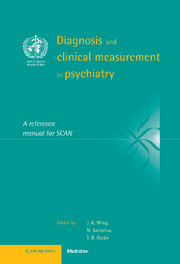Book contents
- Frontmatter
- Contents
- List of authors and SCAN Advisory Committee
- Preface
- Acknowledgements
- 1 Measurement and classification in psychiatry
- 2 The PSE tradition and its continuation in SCAN
- 3 Aims and structure of SCAN
- 4 The SCAN Glossary and principles of the interview
- 5 SCAN translation
- 6 Technical procedures
- 7 Training in the use of SCAN
- 8 International field trials: SCAN-0
- 9 SCAN-1: Algorithms and CAPSE-1
- 10 Development of SCAN-2.1
- 11 Computerisation of SCAN-2.1: CAPSE-2
- 12 Clinical, educational and scientific uses
- Subject index
4 - The SCAN Glossary and principles of the interview
Published online by Cambridge University Press: 05 August 2016
- Frontmatter
- Contents
- List of authors and SCAN Advisory Committee
- Preface
- Acknowledgements
- 1 Measurement and classification in psychiatry
- 2 The PSE tradition and its continuation in SCAN
- 3 Aims and structure of SCAN
- 4 The SCAN Glossary and principles of the interview
- 5 SCAN translation
- 6 Technical procedures
- 7 Training in the use of SCAN
- 8 International field trials: SCAN-0
- 9 SCAN-1: Algorithms and CAPSE-1
- 10 Development of SCAN-2.1
- 11 Computerisation of SCAN-2.1: CAPSE-2
- 12 Clinical, educational and scientific uses
- Subject index
Summary
Introduction
Both the limitations and the advantages of SCAN stem from the nature of the problems it attempts to solve. These problems are not specific to psychiatry but they are more obvious and more complex than many of those met elsewhere in medicine, largely because the most characteristic symptoms are subjective; known only because a person describes them. Observable signs do exist, such as autonomic arousal in someone describing a subjective feeling of anxiety, or evidence of concomitant activity in the cortex while describing auditory hallucinations. But the reported experience is often the only evidence available. The first and most basic problem, therefore, is to decide whether a symptom is present or absent. The second problem, an extension of the first, is to assess clinical severity.
In many cases, particularly during an acute attack, both decisions are relatively simple because the symptom is clearly present in severe degree. In others, the experience described is so rare that, unless there is evidence to the contrary (e.g. contacts with medical textbooks or with people who talk about the experience, together with possible reasons for dissimulation) an accurate description is adequate to establish its presence, if not its severity. Some first-rank symptoms are of this type. Other symptoms, such as anxiety and depression, are very common in mild degree. Should they nevertheless be rated as present, if there is no reason to doubt the description, even though they are accompanied by only trivial interference with occupational or personal functioning? Such decisions are of great importance in general practice or a general population survey.
No selection of symptoms, and no set of definitions, will satisfy everybody. Nor should they. Karl Koehler (1979) observed that the only interesting question in such circumstances is whether divergent views about particular symptoms can be specified. If not, discussion may be fascinating but cannot reach conclusions. There is a risk in relying only on criteria that are communicable and can be checked (Berner et al., 1980; Berner and Kuffele, 1982), since concepts that cannot be defined may have value when used by percipient clinicians who are nevertheless unable to provide a definition for general use. But until they are more precisely specified they cannot be understood and reliably used for comparative purposes.
- Type
- Chapter
- Information
- Diagnosis and Clinical Measurement in PsychiatryA Reference Manual for SCAN, pp. 36 - 43Publisher: Cambridge University PressPrint publication year: 1998
- 1
- Cited by



